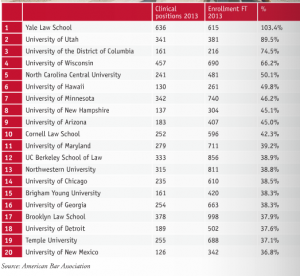From Law School to Law Practice: The Importance of Clinicals
 Unless we were working in some capacity in which we were actually dealing with clients, everything we learned in law school was theoretical. Maybe we motivated ourselves by imagining that some day we would be able to apply what we were learning. More likely, considering that many of us had no idea at the time what area of the law we would be practicing, we were motivated by a desire to do well on exams so that we could earn good grades.
Unless we were working in some capacity in which we were actually dealing with clients, everything we learned in law school was theoretical. Maybe we motivated ourselves by imagining that some day we would be able to apply what we were learning. More likely, considering that many of us had no idea at the time what area of the law we would be practicing, we were motivated by a desire to do well on exams so that we could earn good grades.
The beauty of actually practicing law is that there is suddenly a concrete purpose for everything we learn. We can actually use our knowledge to benefit a live human being. The more competitive among us may also be driven by a desire to beat the other side.
This is the beauty of the “clinicals” offered by many law schools, and I was pleased to see that Temple University, where I went to law school, ranks within the top 20 of a list prepared by the National Jurist of clinical programs offered by law schools. (Yale was #1. The University of the District of Columbia is #3.) I myself took advantage of every opportunity I had to do a clinical while in law school, doing one at the Federal Defender and another at the public defender’s office.
At Above the Law, Joe Patrice points out that “having top-notch clinical experience” at a lower tier law school will not substantially improve a student’s job prospects, particularly in relation to a student graduating from a more prestigious school. But this really is beside the point: Although no amount of completed clinicals will ensure that we are “practice ready” by the time we graduate, the clinicals provide a nice change of pace and a break from exams. They also give us a fleeting glimpse into the practical applications to come, along with the motivation that accompanies that glimpse.
